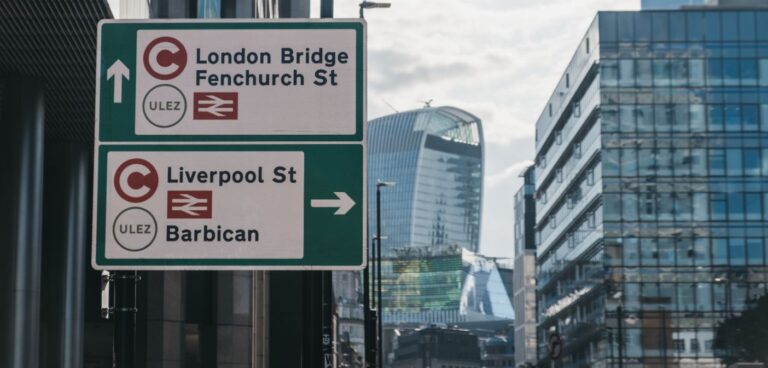The Mayor of London, Sadiq Khan, has today announced that he will expand the Ultra Low Emission Zone (ULEZ) London-wide.
The second expansion will come into effect on Tuesday 29 August 2023 and will operate across all London boroughs up to the existing Low Emission Zone (LEZ) boundary.
The announcement follows a public consultation, which ran between May and July 2022, in which 59% of respondents reportedly agreed that more needed to be done to tackle air pollution.
Since launching in 2019, the ULEZ has reportedly helped to reduce roadside pollution levels by 44% in central London and 20% in inner London.
And, according to Khan, expanding ULEZ London-wide will save 27,000 tonnes of CO2 in outer London, nearly double that which the central London ULEZ achieved in its first year of operation.
What’s more, the expansion is forecast to reduce nitrogen oxides emissions from cars and vans in outer London by 10% and 7% percent respectively, and reduce PM2.5 car exhaust emissions in outer London by nearly 16%.
Khan, said: “The ULEZ so far has been transformational, reducing harmful pollution levels by almost a half in central London.
“But there is still far too much toxic air pollution permanently damaging the health of young Londoners and leading to thousands of early deaths every year, with the greatest number of deaths in the outer London boroughs.
“Expanding the ULEZ London-wide will mean five million more people will be able to breathe cleaner air and live healthier lives.”
The expansion will be accompanied by a new £110m scrappage scheme – open for applications on 30 January 2023 – to support Londoners on lower incomes, disabled Londoners, charities and small businesses and sole traders.
Londoners receiving certain means-tested benefits and non-means-tested disability benefits can apply for grants of up to £2,000 to scrap their non-compliant cars or motorcycles.
Disabled people who want to scrap a non-compliant wheelchair accessible vehicle and those with certain other adaptations will be able to apply for grants of £5,000 to reflect the higher cost of these vehicles.
Charities, sole traders and micro-businesses registered in London can apply to scrap a van (£5,000 grant) or a minibus (£7,000 grant), retrofit certain vans or minibuses (£5,000 grant) or scrap and replace a van or minibus with a fully electric vehicle (£7,500 or £9,500 grant respectively).
In addition to being used to purchase compliant vehicles, funds from the scrappage scheme can be put toward public transport, pedal bikes, e-bikes and car clubs, and includes an option to get up to two annual bus and tram passes.
Khan also announced an extension to the existing exemption periods for London’s disabled drivers and community transport minibuses run by not-for-profit organisations to October 2027 and October 2025 respectively, and the introduction of new exemption periods for disabled drivers and wheelchair accessible vehicles.
What’s more, the £10 per-vehicle fee for drivers to sign up to Auto-Pay for the ULEZ and Congestion Charge (CC) has been scrapped.
The ULEZ charge will remain £12.50 a day for non-compliant vehicles and TfL will increase the penalty charge notice level to £180 – reduced to £90 if paid within 14 days – “to maintain the deterrent effect of the scheme and achieve the scheme’s air quality and health objectives”.
According to Khan, all money raised by ULEZ will be put back into funding local public transport and improvements to the bus network in outer London will be made to encourage alternative transport to private cars.
For example, two new routes will be introduced in Sutton and new zero-emission cross-river services will be introduced in east London, subject to consultation, as part of what’s claimed to be “the biggest ever expansion of the bus network in outer London”, with more than “one million further kilometres added”.
Compliance within the current ULEZ area is reportedly now at 94%, higher than the 39% when ULEZ was announced in 2017, and also higher than 85% the month before the previous expansion, and compliance in outer London is said to currently be around 85%.





